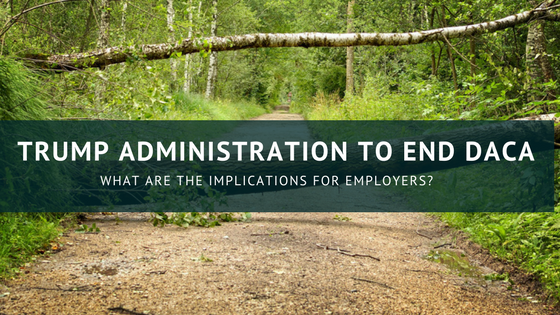Trump Administration to End DACA – What Does That Mean for Employers?
On September 5, 2017, the Trump administration announced that the Deferred Action for Childhood Arrivals (“DACA”) program will end. DACA will remain in place until March 5, 2018 and the program will be phased out over the next two years.
DACA Revocation Details
The Department of Homeland Security (“DHS”) has released details and clarifications regarding the revocation of the DACA program. The key points of the revocation are:
- DHS will process initial requests for DACA and work authorization received on or before September 5, 2017 – in other words, all submitted and pending requests will be processed;
- DHS will not accept new initial DACA requests after September 5, 2017;
- DHS will process DACA extensions from current beneficiaries whose benefits will expire on or before March 5, 2018 but such applications must be accepted by DHS not later than October 5, 2017.
- DACA beneficiaries with current work authorization document (EAD) will remain authorized to work until the EAD expiration date, unless their status is revoked earlier.
Impact and Implications to US Employers – Valid DACA Work Permit Continues to Authorize Employment
The DACA program has provided work and temporary residency authorization for nearly 800,000 beneficiaries. Reports indicate that the vast majority of the DACA recipients are either in the labor force or in school and the end of the DACA program will likely cause major disruption not only to the DACA beneficiaries but also to their employers.
DACA work permits are valid for two years and employers should not take any adverse action or discriminate against DACA work permit holders simply because of the type of work authorization used. The Department of Justice has advised that employers,
[C]annot refuse to hire an individual solely because that individual’s employment authorization document will expire in the future. The existence of a future expiration date does not preclude continuous employment authorization for a worker and does not mean that subsequent employment authorization will not be granted. In addition, consideration of a future employment authorization expiration date in determining whether an individual is qualified for a particular job may constitute an unfair immigration-related employment practice in violation of the anti-discrimination provision of the INA [Immigration and Nationality Act].
Additionally, relevant sections of INA restrict an employer’s ability to use I-9 information. As a result, because DACA is not employer-sponsored work authorization, employers should not use their I-9 records databases to search for DACA holders or risk violating the anti-discrimination provisions of the immigration laws. Employers should, however, rely on their I-9 databases to determine the length of approved work authorization, including for expiring DACA work permits.
Congressional Fix?
As a result of this announcement, it is expected that Congress will, at least, try to pass legislation to protect DACA beneficiaries. There are a number of bills introduced in Congress and we will continue to monitor and provide updates as soon as some of these bills get traction and are closer to becoming a law.
Conclusion
Our office will continue monitoring related developments and provide updates. In the meantime, we recommend DACA holders and employers to continue to monitor developments on this topic over the coming few months. Please do not hesitate to contact us if we can be of any help. Also, please feel free to subscribe to our free weekly newsletter to obtain developments on this and related topics
Related News and Articles
The Capitol Immigration Law Group has been serving the business community for over 15 years and is one of the most widely respected immigration law firms focused solely on U.S. employment-based immigration. Disclaimer: we make all efforts to provide timely and accurate information; however, the information in this article may become outdated or may not be applicable to a specific set of facts. It is not to be construed as legal advice.

